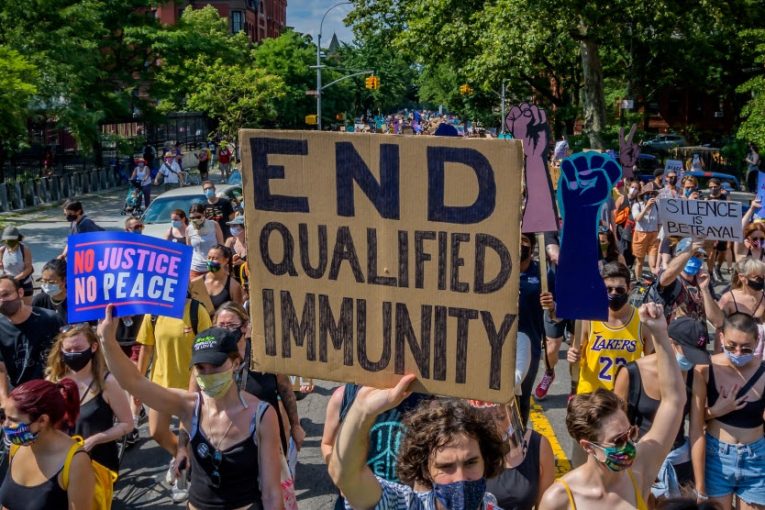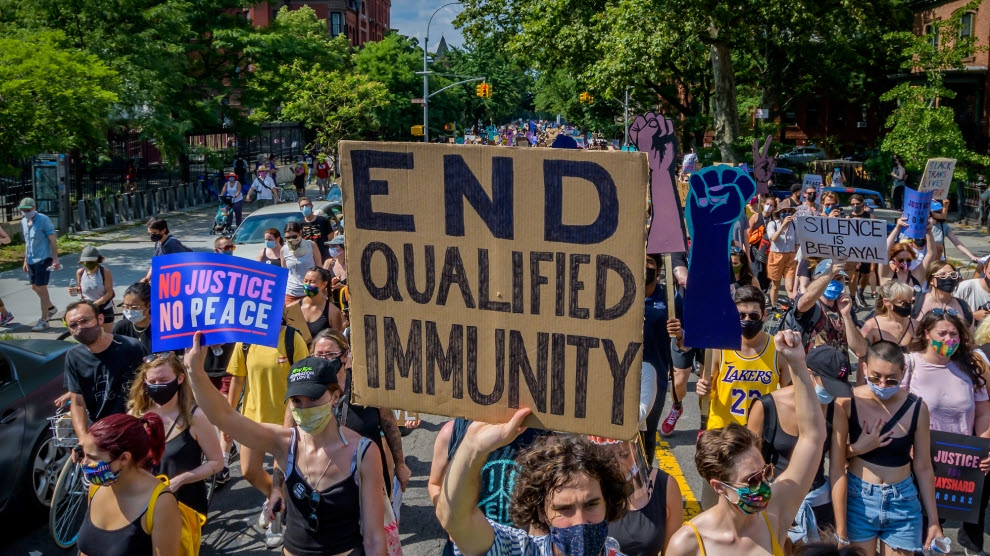

This week, the Law Enforcement Action Partnership released a letter addressed to Congress calling for an end to qualified immunity, a legal doctrine which says that police cannot be tried for even blatant violations of the law unless there is a precedent with identical circumstances, making it almost impossible to sue police in civil court. Fifty-four current and retired police officers, judges, prosecutors, and federal agents from across the country signed the letter, which identifies qualified immunity as damaging for communities, damaging for police, and unnecessary for protecting police from unwarranted persecution.
“Qualified immunity is a serious public safety concern,” said Lt. Diane Goldstein (Ret.), 21-year police veteran and executive director of LEAP. “When Americans see one officer after another receive no legal consequences for violating the Constitution, they lose confidence in police and stop talking to us. We need to reimagine accountability if we want people to work collaboratively with us to keep communities safe.”
The letter asserts that qualified immunity “prevents legitimate cases from being heard” and that police are offered other legal protections from frivolous, meritless lawsuits. The letter goes further to quell fears that police may have about the consequences of eliminating qualified immunity:
“In short, ending qualified immunity will not bring open season upon law enforcement. It will simply allow judges to hear the facts of the most egregious cases, which are currently causing the public perception that police are above the law.”
This letter fits alongside the support of 1,100 athletes led by the Players Coalition, over 670 business leaders, 450 creative artists led by Aloe Blacc, and 247 members of Congress who support the Campaign to End Qualified Immunity.
Dear Members of the United States Congress:
As current and former police, judges, prosecutors, corrections officials, and federal agents, we have a duty to speak up about issues affecting our communities and our country.
In order to improve public safety, we need to build trust in law enforcement, and in order to build trust, there must be transparency and accountability. As such, we believe it is crucial to end a legal doctrine that has contributed to the erosion of public trust in the justice system and made all of us less safe: qualified immunity.
Trusting relationships between police and civilians are not just a preference; they are a requirement for public safety. Without these relationships, police are left to investigate crimes with little to no help from the people we serve. People have so little trust in us that a majority of violent crimes go unreported, even by victims themselves. Our institutions are failing to protect and serve in part because people have lost trust in our ability to make a difference and would rather take matters into their own hands or suffer in silence.
One major reason that people do not trust law enforcement is that they believe police are not held accountable to the law. A key reason for this belief is the qualified immunity doctrine.
Qualified immunity can prevent legitimate cases from being heard when someone files a civil lawsuit because a police officer violated their constitutional rights. The doctrine holds officers and their agencies harmless unless the officer’s action has already been clearly established as a constitutional violation in that court’s jurisdiction. For example, in Jessop v City of Fresno, police officers stole money, and the victims sued. The Ninth Circuit dismissed the lawsuit on qualified immunity grounds, because no previous Ninth Circuit case specifically said that police stealing from plaintiffs is a violation of the Fourth Amendment. When such cases are dismissed, the media firestorm has a devastating impact on public trust in the justice system.
We understand firsthand why police are concerned about losing the qualified immunity defense, and we want to be clear that this concern is not warranted.
First, qualified immunity is not the officer’s lone shield protecting us from a flood of frivolous lawsuits. Studies show that judges dismiss cases on qualified immunity grounds in less than four percent of civil rights cases involving law enforcement. When cases are without merit, judges dismiss them based on other tools in the federal rules of civil procedure. When cases have merit and shouldn’t be dismissed, these other tools don’t apply, so defense attorneys turn to qualified immunity.
Second, when a case makes it into court, qualified immunity is not the officer’s only defense for actions that were reasonable or in good faith. Our real protection is the Fourth Amendment itself, which is only violated by unreasonable searches or seizures. Officers who acted in a reasonable way considering the heat of the moment are protected by this reasonableness standard, without the need to resort to qualified immunity.
Finally, qualified immunity is not the only thing standing between officers and bankruptcy — in practice, officers are never bankrupted by these lawsuits. When officers’ actions lead to settlements or judgments against them, research shows that 99.98% of the bills get paid by cities. Governments foot the bill even when indemnifying the officer is against local law or policy, and even when the officer is terminated or convicted in criminal court for their conduct. Ending qualified immunity will not change this practice. Officers will not be bankrupted by settlements, judgments, or personal liability insurance.
In short, ending qualified immunity will not bring open season upon law enforcement. It will simply allow judges to hear the facts of the most egregious cases, which are currently causing the public perception that police are above the law.
While the qualified immunity headlines focus on law enforcement, we are not singling out police. We support ending qualified immunity for all public employees. The doctrine is unnecessary and counterproductive across all areas of government.
Qualified immunity is deeply unpopular. Two-thirds of Americans say that civilians need to have the power to sue police officers in order to hold them accountable for misconduct and excessive use of force, even if that makes police work more difficult. In fact, we believe it will make police work easier by helping us rebuild community trust.
The nationwide uprisings after the killing of George Floyd last summer indicate a breaking point. We can keep going down this same road, or we can chart a better path that inspires trust in police work. We do not expect perfection from police; we simply expect that officers who break our oath to protect and serve are held accountable for their actions. Qualified immunity stands in the way of accountability.
We urge you to restore accountability to those of us charged with upholding the law and protecting our communities. The safety of our communities requires no less.
Respectfully,
Lt. Diane Goldstein (Ret.) – Redondo Beach Police Department, CA Executive Director
Sgt.Terry Blevins (Fmr.) – Gila County Sheriff’s Office, AZ
Det. Justin Boardman (Fmr.) – West Valley City Police Department, UT
Lt. Nick Bucci (Ret.) New Jersey State Police
Detective Matthew Bughman Milwaukee Police Department,WI
Officer Brian Chapman (Fmr.) – Dallas County Community Supervision & Correction Department,TX
Officer Beth Comery (Fmr.) Providence Police Department, RI
Chief Brendan Cox (Ret.) Albany Police Department
Chief Drew Diamond (Ret.) Tulsa Police Department, OK
Sgt. Cheryl Dorsey (Ret.) – Los Angeles Police Department, CA
Deputy Chief Stephen Downing (Ret.) Los Angeles Police Department, CA
Deputy Sheriff Alyshia Dyer – Washtenaw County Sheriff’s Department, MI
Deputy Sheriff Jay Fleming (Fmr.) Park County, MT
Officer Dave Franco (Ret.) Chicago Police Department, IL
Major Neill Franklin (Ret.) Maryland State Police
Judge Leonard Frieling (Fmr.) – City of Lafayette Municipal Court, CO
Chief Betty Frizzell (Ret.) Winfield Police Department, MO
Inge Fryklund – Former Assistant State’s Attorney Cook County, IL
Officer Brian Gaughan (Ret.) Iowa and Illinois Police
Judge James P. Gray (Ret.) Superior Court of California
Lt. Jay Hall (Ret.) – Houston Police Department,TX
Chief Robert J. Hoffman (Ret.) Plainfield Police Department, CT
Corporal Mauri Jackson (Fmr.) Arkansas Department of Corrections
Officer Wes E. Johnson (Fmr.) – New Castle Police Department, DE
Officer Jeff Kaufman (Fmr.) – New York Police Department, NY
Brian Leininger – Former Assistant District Attorney 29th Judicial District of Kansas
Special Agent David Long (Fmr.) Office of the Inspector General, U.S. Department of Labor
Investigator Brodie Mack (Ret.) New York State Police
Captain Leigh Maddox (Ret.) Maryland State Police
Judge Mary Helen Maynard (Ret.) – Santa Cruz County Justice Court and Superior Court, AZ
Judge Gordon McAllister (Ret.) District Court of Tulsa, OK
Officer Matthew McCally (Fmr.) – Washington State Department of Corrections
Chief Isaiah McKinnon (Ret.) Detroit Police Department, MI
Sergeant Steve Miller (Ret.) Canton Police Department, MI
Officer Janell Murphey (Fmr.) Salina Police Department, KS
Commander David Myers (Ret.) San Diego Sheriff’s Department, CA
Det. Sgt.Ted Nelson (Ret.) Michigan State Police
Col. David Parrish (Ret.) Hillsborough County Sheriff’s Office
Deputy Inspector Corey Pegues (Ret.) New York Police Department, NY
Captain Sonia Pruitt (Ret.) – Montgomery County Police Department, MD
Detective Debbie Ramsey (Ret.) Baltimore Police Department, MD
Chief Rob Reyes (Fmr.) – U.S. Department of Veterans’ Affairs Police Department, PA
Officer Bryan Rose (Fmr.) Irving Police Department,TX
Special Agent Finn Selander (Ret.) Drug Enforcement Administration
Dr. Erroll Southers – Former Assistant Chief of Homeland Security and Intelligence, Los Angeles World Airports Police Department
Chief Norm Stamper (Ret.) Seattle Police Department,WA
Officer Seth Stoughton (Fmr.) Tallahassee Police Department, FL
Special Agent Ray Strack (Ret.) – Department of Homeland Security, Immigration and Customs Enforcement
Officer Silvestre Tanenbaum (Fmr.) Carrollton Police Department,TX
Sgt. Carl Tennenbaum (Ret.) – San Francisco Police Department, CA
Allison Watson – Former Assistant District Attorney 13th Judicial District of Tennessee
Officer Jack Wilborn (Ret.) – Glendale Police Department Reserves, AZ
Officer Shannon Wintruba (Ret.) Whitaker Police Department, PA
Chief Deputy Matthew Fogg (Ret.) – U.S. Marshals Service
To sign up for our new newsletter – Everyday Injustice – https://tinyurl.com/yyultcf9
Support our work – to become a sustaining at $5 – $10- $25 per month hit the link: